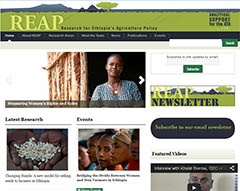Did you know that IFPRI has worked in Ethiopia for over 30 years? The partnership dates back to the 1980s, where IFPRI’s research originally focused on “famine and food insecurity.”
More than thirty years and nearly 350 publications later, IFPRI has a country office in Addis Ababa, a program— Ethiopia Strategy Support Program (ESSP)—that collaborates with the Ethiopian Development Research Institute and research projects such as the Productive Safety Net Program, the Ethiopian Rural Household Survey, and the Ethiopian computable general equilibrium (CGE) model. IFPRI’s research portfolio in Ethiopia covers a wide range of topics, from gender equality in the farm sector to sustainable land management.
IFPRI’s latest partnership in Ethiopia is Research for Ethiopia’s Agriculture Policy (REAP), a policy research support program for the Ethiopian Agricultural Transformation Agency (ATA) jointly implemented by national and international partners. The foundation for the ATA was laid in 2009, when former Ethiopian Prime Minister Meles Zenawi approached the Gates Foundation to support a complete review of Ethiopia’s agricultural sector. “At that time, the Gates Foundation identified IFPRI as an important organization that could help do the diagnostic studies in key parts of the agricultural sector,” says Khalid Bomba, CEO of the ATA. The studies included topics such as seeds, soil fertility and irrigation to name a few. “These diagnostics, which included the seed sector, extension, soil, and irrigation among others, led to the creation of the ATA,” Bomba continued.
The project’s newly designed website offers a wealth of resources on the project’s activities, including a blog, video interviews with Bomba and REAP Project Leader and IFPRI Senior Research Fellow Shahid Rashid, news updates from the field, and the latest research.
Visit the new site to learn about research activities such as:
- A forthcoming digital soil map of Ethiopia based on remote sensing, satellite imagery, and spectroscopic readings with a rich collection of over 100,000 soil samples.
- Fertilizer-blending facilities, where unique blends of nutrients are being created to replenish the missing nutrients in farmers’ land. Already the first blending facility has been opened in the Oromia region. The facility, along with four more under construction, will play a leading role in supplying farmers with fertilizer blends that target missing nutrients in their soil.
- Efforts towards closing the gender gap in farming, notably a July workshop that brought together people from diverse organizations to streamline joint efforts to close the gender gap in Ethiopia’s farm sector. The event, organized in partnership with the Ethiopian Ministry of Agriculture’s Women’s Affairs Directorate, the Ethiopian Institute of Agricultural Research (EIAR), the ATA, and the CGIAR Research Program on Policies, Institutions, and Markets (PIM), drew a crowd of 70 professionals all working towards gender equality in various capacities. Moving forward, REAP will support the ATA’s plans to develop gender-based agricultural indicators for the next phase of Ethiopia’s Growth and Transformation Plan. These indicators are essential for monitoring progress toward achieving gender equality.
Related materials
- Transcript of the full interview with Khalid Bomba
- IFPRI publications on Ethiopia
- Subscribe to REAP’s project newsletter







